- Home
- Fergus Hume
The Mystery of a Hansom Cab Page 22
The Mystery of a Hansom Cab Read online
Page 22
‘That puts me in mind of what I heard Dr Chinston say yesterday,’ she said. ‘This is the age of unrest, as electricity and steam have turned us all into Bohemians.’
‘Ah! Bohemia is a pleasant place,’ said Brian absently, unconsciously quoting Thackeray, ‘but we all lose our way to it late in life.’
‘At that rate we won’t lose our way to it for some time,’ she said laughing, as they stepped into the drawing-room, so cool and shady, after the heat and glare outside.
As they entered Mr Frettlby arose out of a chair near the window, and appeared to have been reading, as he held a book in his hand.
‘What! Fitzgerald,’ he exclaimed, in a hearty tone, as he held out his hand, ‘I am glad to see you.’
‘I let you know I am living, don’t I?’ replied Brian, his fair face flushing as he reluctantly took the proffered hand. ‘But the fact is I have come to say goodbye for a few days.’
‘Ah! going back to town, I suppose,’ said Mr Frettlby, lying back in his chair, and playing with his watch chain. ‘I don’t know that you are wise, exchanging the clear air of the country for the dusty atmosphere of Melbourne.’
‘Yet Madge tells me you are going back,’ said Brian, idly toying with a vase of flowers on the table.
‘Depends upon circumstances,’ replied Midas, carelessly. ‘I may and I may not. You go on business, I presume?’
‘Well, the fact is Calton—’ Here Brian stopped suddenly, and bit his lip with vexation, for he had not intended to mention the lawyer’s name.
‘Yes?’ said Mr Frettlby interrogatively, sitting up quickly, and looking keenly at Brian.
‘Wants to see me about business,’ he finished awkwardly.
‘Connected with the sale of your station, I suppose,’ said Frettlby, still keeping his eyes on the young man’s face. ‘Can’t have a better man. Calton’s an excellent man of business.’
‘A little too excellent,’ replied Fitzgerald, ruefully, ‘he’s a man that can’t leave well alone.’
‘Apropos of what?’
‘Oh, nothing,’ answered Fitzgerald hastily, and just then his eyes met those of Frettlby. The two men looked at one another steadily for a moment, but in that short space of time a single name flashed through their brains—that name was Rosanna Moore. Mr Frettlby was the first to lower his eyes, and break the magnetism.
‘Ah, well,’ he said lightly, as he arose from his chair, and held out his hand, ‘if you are two weeks in town call at St Kilda, and it’s more than likely you will find us there.’
Brian shook hands in silence, and watched him pick up his hat, and move on to the verandah, and then out into the hot sunshine.
‘He knows,’ he muttered, involuntarily.
‘Knows what, sir?’ said Madge, who came silently behind him, and slipped her arm through his. ‘That you are hungry, and want something to eat before you leave us?’
‘I don’t feel hungry,’ said Brian, as they walked towards the door.
‘Nonsense,’ answered Madge merrily, who, like Eve, was on hospitable thoughts intent. ‘I’m not going to have you appear in Melbourne a pale, fond lover, as though I were treating you badly. Come sir—no,’ she continued, putting up her hand as he tried to kiss her, ‘business first, pleasure afterwards,’ and they went into the dining-room, laughing.
Mark Frettlby wandered down to the lawn tennis ground, thinking of the look he had seen in Brian’s eyes. He shivered for a moment in the hot sunshine, as though it had grown suddenly chill.
‘Someone stepping across my grave,’ he murmured to himself, with a cynical smile. ‘Bah! how superstitious I am, and yet—he knows, he knows!’
‘Come on sir,’ cried Felix, who had just caught sight of him, ‘a racquet awaits you.’
Frettlby woke with a start, and found himself near the lawn tennis ground, and Felix at his elbow, smoking a cigarette.
He roused himself with a great effort, and tapped the young man lightly on the shoulder.
‘What?’ he said with a forced laugh, ‘do you really expect me to play lawn tennis on such a day—you are mad.’
‘I am hot, you mean,’ retorted the imperturbable Rolleston, blowing a wreath of smoke.
‘That’s a foregone conclusion,’ said Dr Chinston, who came up at that moment.
‘Such a charming novel,’ cried Julia, who had just caught the last remark.
‘What is?’ asked Peterson, rather puzzled.
‘Howell’s book, A Foregone Conclusion,’ said Julia, also looking puzzled. ‘Weren’t you talking about it.’
‘I’m afraid this talk is getting slightly incoherent,’ said Felix, with a sigh. ‘We all seem madder than usual today.’
‘Speak for yourself,’ said Chinston, indignantly. ‘I’m as sane as any man in the world.’
‘Exactly,’ retorted the other coolly, ‘that’s what I say, and you, being a doctor, ought to know that every man and woman in the world is more or less mad.’
‘Where are your facts?’ asked Chinston, smiling.
‘My facts are all visible ones,’ said Felix, gravely, pointing to the company. ‘They’re all crooked on some point or another.’
There was a chorus of indignant denial at this, and then everyone burst out laughing at the extraordinary way in which Mr Rolleston was arguing.
‘If you go on like that in the House,’ said Frettlby amused, ‘you will, at all events, have an entertaining Parliament.’
‘Ah! they’ll never have an entertaining Parliament till they admit ladies,’ observed Peterson with a quizzical glance at Julia.
‘It will be a Parliament of love then,’ retorted the doctor dryly, ‘and not medieval either.’
While everyone was laughing at this remark, Frettlby took the doctor’s arm, and walked away with him. ‘I want you to come up to my study, doctor,’ he said, as they strolled towards the house, ‘and examine me.’
‘Why, don’t you feel well?’ said Chinston, as they entered the house.
‘Not lately,’ replied Frettlby. ‘I’m afraid I’ve got heart disease.’
The doctor looked sharply at him, and then shook his head.
‘Nonsense,’ he said, cheerfully, ‘It’s a common delusion with people that they have heart disease, and in nine cases out of ten it’s all imagination, unless, indeed,’ he added waggishly, ‘the patient happens to be a young man.’
‘Ah! I suppose you think I’m safe as far as that goes,’ said Frettlby, as they entered the study, ‘And what did you think of Rolleston’s argument about people being mad?’
‘It was amusing,’ replied Chinston, taking a seat, Frettlby doing the same. ‘That’s all I can say about it, though, mind you, I think there are more mad people at large than the world is aware of.’
‘Indeed!’
‘Yes; do you remember that horrible story of Dickens, in the Pickwick Papers, about the man who was mad, and knew it, yet successfully concealed it for years? Well, I believe there are many people like that in the world, people whose lives are one long struggle against insanity, and yet who eat, drink, talk and walk with the rest of their fellow men, evidently as gay and light-hearted as they are.’
‘How extraordinary.’
‘Half the murders and suicides are done in temporary fits of insanity,’ went on Chinston, ‘and if a person broods over anything, his incipient madness is sure to break out sooner or later, but, of course, there are cases where a perfectly sane person may commit a murder on the impulse of the moment, but I regard such persons as mad for the time being; but, again, a murder may be planned and executed in the most cold-blooded manner.’
‘And in the latter case,’ said Frettlby, without looking at the doctor, and playing with the paper knife, ‘do you regard the murderer as mad?’
‘Yes, I do,’ answered the doctor bluntly. ‘He is as mad as a person who kills another because he supposes he has been told by God to do so—only there is method in his madness. For instance, I believe that hansom cab murder, in which yo
u were mixed up—’
‘Damn it, sir, I wasn’t mixed up in it,’ interrupted Frettlby, pale with anger.
‘Beg pardon,’ said Chinston coolly, ‘a slip of the tongue; I was thinking of Fitzgerald. Well, I believe that crime to have been premeditated, and that the man who committed it was mad. He is, no doubt, at large now walking about and conducting himself as sane as you or I, yet the germ of insanity is there, and sooner or later he will commit another crime.’
‘How do you know it was premeditated?’ asked Frettlby, abruptly.
‘Anyone can see that,’ answered the other. ‘Whyte was watched on that night, and when Fitzgerald went away the other was ready to take his place, dressed the same.’
‘That’s nothing,’ retorted Frettlby, looking at his companion, sharply. ‘There are dozens of men in Melbourne who wear evening dress, light coats and soft hats—in fact, I generally wear them myself.’
‘Well, that might have been a coincidence,’ said the doctor, rather disconcerted, ‘but the use of chloroform puts the question beyond a doubt; people don’t usually carry chloroform about with them.’
‘I suppose not,’ answered the other, and then the matter dropped. Chinston made an examination of Mark Frettlby, and when he finished, his face was very grave, though he laughed at the millionaire’s fears.
‘You’re all right,’ he said gaily. ‘Action of the heart a little weak, that’s all—only,’ impressively, ‘avoid excitement—avoid excitement.’
Just as Frettlby was putting on his coat, a knock came to the door, and Madge entered.
‘Brian is gone,’ she began. ‘Oh, I beg your pardon, doctor—but is papa ill?’ she asked with sudden fear.
‘No, child, no,’ said Frettlby hastily, ‘I’m all right, I thought my heart was affected, but it isn’t.’
‘Not a bit of it,’ answered Chinston reassuringly. ‘All right—only avoid excitement.’
But when Frettlby turned to go to the door, Madge, who had her eyes fixed on the doctor’s face, saw how grave it was.
‘There is danger,’ she said, touching his arm as they paused, for a moment, at the door.
‘No! No!’ he answered hastily.
‘Yes, there is,’ she persisted. ‘Tell me the worst, it is best for me to know.’
The doctor looked at her in some doubt for a few moments, and then placed his hand on her shoulder, ‘My dear young lady,’ he said gravely, ‘I will tell you what I have not dared to tell your father.’
‘What?’ she asked in a low voice, her face growing pale.
‘His heart is affected.’
‘And there is great danger?’
‘Yes, great danger. In the event of any sudden shock—’ he hesitated.
‘Yes—’
‘He would probably drop down dead.’
‘God!’
CHAPTER TWENTY-SIX
KILSIP HAS A THEORY OF HIS OWN
Mr Calton sat in his office reading a letter he had just received from Fitzgerald, and it seemed to give him great satisfaction, judging from the complacent smile on his face. ‘I know,’ wrote Brian, ‘that now you have taken up the affair you will not stop until you find everything out, so, as I want the matter to rest as at present, I will anticipate you, and reveal all. You were right in your conjecture that I knew something likely to lead to the detection of Whyte’s murderer; but when I tell you my reasons for keeping such a thing secret, I am sure you will not blame me. Mind you, I do not say that I know who committed the murder; but I have suspicions—very strong suspicions—and I wish to God Rosanna Moore had died before she told me what she did. However, I will tell you all, and leave you to judge as to whether I was justified in concealing what I was told. I will call at your office some time next week, and then you will know everything that Rosanna Moore told me; but once that you are possessed of the knowledge, you will pity me.’
‘Most extraordinary,’ mused Calton, leaning back in his chair as he laid down the letter. ‘I wonder if he’s going to tell me that he killed Whyte after all, and that Sal Rawlins perjured herself to save him! No, that’s nonsense, or she’d have turned up in better time, and wouldn’t have risked his neck up to the last moment. Though I make it a rule never to be surprised at anything, I expect what Brian Fitzgerald tells me will startle me considerably. I’ve never met with such an extraordinary case, and from all appearances the end isn’t reached yet. After all,’ said Mr Calton, thoughtfully, ‘truth is stranger than fiction.’
Here a knock came to the door, and in answer to an invitation to enter, it opened, and Kilsip glided into the room.
‘You’re not engaged, sir?’ he said, in his soft, low voice.
‘Oh, dear, no,’ answered Calton, carelessly; ‘come in—come in!’
Kilsip closed the door softly, and gliding along in his usual velvet-footed manner, sat down in a chair near Calton’s, and placing his hat on the ground, looked keenly at the barrister.
‘Well, Kilsip,’ said Calton, with a yawn, playing with his watch chain, ‘any good news to tell me?’
‘Well, nothing particularly new,’ purred the detective, rubbing his hands together.
‘Nothing new, and nothing true, and no matter,’ said Calton, quoting Emerson. ‘And what have you come to see me about?’
‘The hansom cab murder,’ replied the other, quietly.
‘The devil!’ cried Calton, startled out of his professional dignity. ‘And have you found out who did it?’
‘No!’ answered Kilsip, rather dismally; ‘but I’ve got an idea.’
‘So had Gorby,’ retorted Calton, dryly, ‘an idea that ended in smoke. Have you any practical proofs?’
‘Not yet.’
‘That means you are going to get some?’
‘Well, if possible.’
‘Much virtue in “if”,’ quoted Calton, picking up a pencil, and scribbling idly on his blotting paper. ‘And to whom does your suspicion point?’
‘Aha!’ said Mr Kilsip, cautiously.
‘Don’t know him,’ answered the other, coolly; ‘family name Humbug, I presume. Bosh! Whom do you suspect?’
Kilsip looked round cautiously, as if to make sure they were alone, and then said, in a stage whisper, ‘Roger Moreland!’
‘That was the young man that gave evidence as to how Whyte got drunk?’
Kilsip nodded.
‘Well, and how do you connect him with the murder?’
‘Do you remember in the evidence given by the cabmen, Royston and Rankin, they both swore that the man who was with Whyte on that night wore a diamond ring on the forefinger of the right hand?’
‘What of that? Nearly every second man in Melbourne wears a diamond ring.’
‘But not on the forefinger of the right hand.’
‘Oh! And Moreland wears a ring in that way?’
‘Yes!’
‘Merely a coincidence. Is that all your proof?’
‘All I can obtain at present.’
‘It’s very weak,’ said Calton, scornfully.
‘The weakest proofs may form a chain to hang a man,’ observed Kilsip, sententiously.
‘Moreland gave his evidence clearly enough,’ said Calton, rising, and walking up and down. ‘He met Whyte; they got drunk together. Whyte went out of the hotel, and shortly afterwards Moreland followed with the coat, which was left behind by Whyte, and then someone snatched it from him.’
‘Ah, did they?’ interrupted Kilsip, quickly.
‘So Moreland says,’ said Calton, stopping short. ‘I understand; you think Moreland was not so drunk as he says, and after following Whyte outside, put on his coat, and got into the cab with him.’
‘That is my theory!’
‘It’s ingenious enough,’ said the barrister; ‘but why should Moreland murder Whyte? What motive had he?’
‘Those papers—’
‘Pshaw! another idea of Gorby’s,’ said Calton angrily. ‘How do you know there were any papers?’
The fact is Calton did no
t intend Kilsip to know that Whyte really had papers, until he heard what Fitzgerald had to tell him.
‘And another thing,’ said Calton, resuming his walk, ‘if your theory is correct, which I don’t think it is, what became of Whyte’s coat—has Moreland got it?’
‘No! he has not,’ answered the detective, decisively.
‘You seem very positive about it,’ said the lawyer, after a moment’s pause. ‘Did you ask Moreland about it?’
A reproachful look came into Kilsip’s white face.
‘Not quite so green,’ he said, forcing a smile. ‘I thought you’d a better opinion of me than that, Mr Calton. Ask him—no.’
‘Then how did you find out?’
‘The fact is Moreland is employed as a barman in the Kangaroo Hotel.’
‘A barman!’ echoed Calton, ‘and he came out here as a gentleman of independent fortune. Why, hang it, man, that in itself is sufficient to prove that he had no motive to murder Whyte. Moreland pretty well lived on Whyte, so what could have induced him to kill his golden goose, and become a barman—pshaw, the idea is absurd.’
‘Well, you may be right about the matter,’ said Kilsip rather angrily, ‘and if Gorby makes mistakes I don’t pretend to be infallible. But, at all events, when I saw Moreland in the bar he wore a silver ring on the forefinger of his right hand.’
‘Silver isn’t a diamond.’
‘No; but it showed that was the finger he was accustomed to wear his ring on. When I saw that I determined to search his room. I managed to do so while he was out, and found—’
‘A mare’s nest.’
Kilsip nodded.
‘And so your castle of cards falls to the ground,’ said Calton, jestingly. ‘Your idea is absurd. Moreland no more committed the murder than I did. Why, he was too drunk on that night to do anything.’
‘Humph—so he says.’
‘Well, men don’t calumniate themselves for nothing.’
‘It was a lesser danger to avert a greater one,’ replied Kilsip coolly. ‘I am sure that Moreland was not drunk on that night. He only said so to escape awkward questions as to his movements. Depend upon it he knows more than he lets out.’

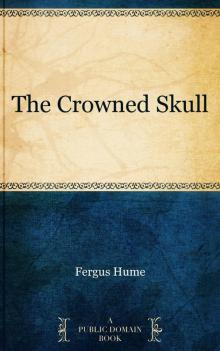 The Crowned Skull
The Crowned Skull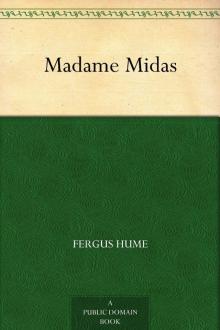 Madame Midas
Madame Midas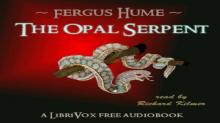 The Opal Serpent
The Opal Serpent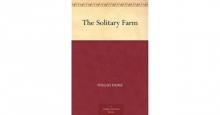 The Solitary Farm
The Solitary Farm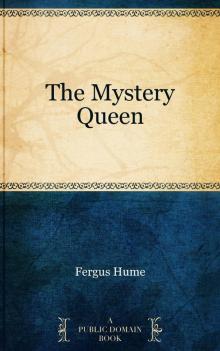 The Mystery Queen
The Mystery Queen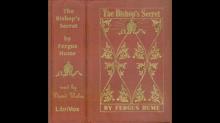 The Bishop's Secret
The Bishop's Secret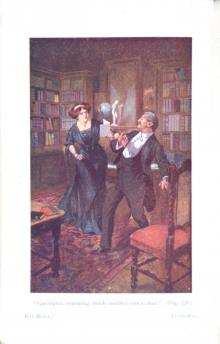 Red Money
Red Money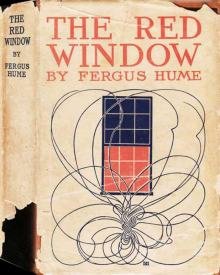 The Red Window
The Red Window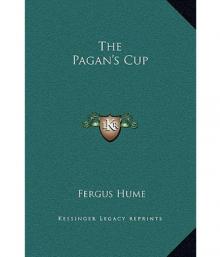 The Pagan's Cup
The Pagan's Cup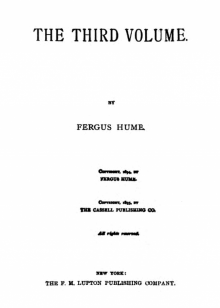 The Third Volume
The Third Volume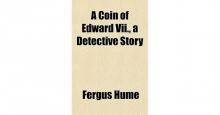 A Coin of Edward VII: A Detective Story
A Coin of Edward VII: A Detective Story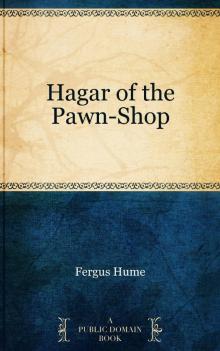 Hagar of the Pawn-Shop
Hagar of the Pawn-Shop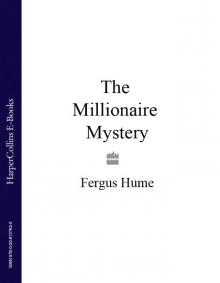 The Millionaire Mystery
The Millionaire Mystery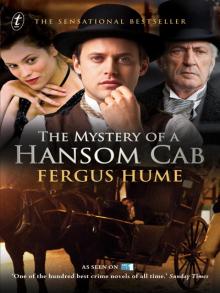 The Mystery of a Hansom Cab
The Mystery of a Hansom Cab